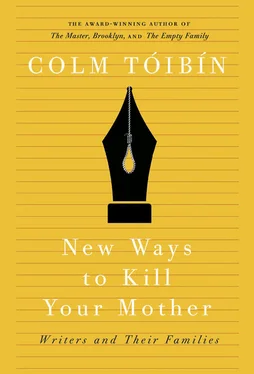In Pride and Prejudice the two aunts also represent a changing England. Mrs Gardiner’s husband, who is Mrs Bennet’s brother, lived from trade. He was, we are told, ‘greatly superior to his sister, as well by nature as education’ and it is pointed out that the Netherfield ladies, Mr Bingley’s sisters, superior and snobbish and alert to class difference, ‘would have had difficulty in believing that a man who lived by trade, and within view of his own warehouses, could have been so well bred and agreeable’. His wife ‘was an amiable, intelligent, elegant woman, and a great favourite with all her… nieces. Between the two eldest and herself especially, there subsisted a very particular regard.’ It is to her house in London that the sisters repair in that hushed interregnum in the book when both Bingley and Darcy have disappeared and with them the prospects for Jane. It is while travelling with her aunt and uncle that Elizabeth renews her relations with Darcy. It is via them that she discovers that Darcy has rescued her sister Lydia. In other words, the Gardiners in Pride and Prejudice offer stillness, unforced opportunity, vital information, none of which is available from their mother, or indeed their father. This idea that the sisters have to be removed from the family home for the novel to proceed makes the role of their uncle and aunt essential in the book, but also natural.
Austen feels free, on the other hand, to make Lady Catherine de Bourgh imperious and comic, her wealth and power serving to make her ridiculous rather than impressive. She is an aunt who does not prevail; her presence in the book succeeds in making Darcy her nephew more individual, more himself and less part of any system. His aunt’s function is not merely then to amuse us, or to show us an aspect of English manners that Jane Austen thought was foolish, but to allow her nephew, who refuses to obey her, a sort of freedom, a way of standing alone, that will make him worthy of Elizabeth and worthy too of the novel’s moral shape. Its suggestion that only those who are prepared to move outside their family’s arena of influence, to move out of the sphere of blood and inheritance as the centre of control, towards the autonomous and the personal, will become important in other areas of English life as the nineteenth century proceeds.
Austen understood, however, the strange dynamic of an extended family and how much could be made fluid and uncertain, detached and semi-detached, within its boundaries. Within their family, both Jane Austen and her sister Cassandra, as Marilyn Butler has pointed out in ‘Jane Austen and the War of Ideas’, ‘played a key role as travellers between the households [of their brothers] and assiduous correspondents… Jane somewhat closer to and more preoccupied with two of her younger brothers — Henry, said to have been her favourite, who lived in London, and the sailor Frank, who reported to her from various war fronts… The sisters made good aunts and friends to the next generation.’
Since two of her brothers, Frank and Charles, went to sea and were away from home for long periods of time, it is easy to see the intensely tender and constant feelings that Fanny Price in Mansfield Park has for her brother William, also away at sea, as being a fundamental part of Austen’s emotional world. The novel itself begins by breaking a family, by taking Fanny Price from her own impoverished family and handing her, almost as a changeling, to the care of her two aunts. The fact that she is penniless leaves her unprotected and requires her to be timid and passive.
Since the opening of the novel has all the bearings of a fairy tale, it must have been tempting for Austen to make Lady Bertram, the aunt in whose house Fanny will live, an evil ogre and make Mrs Norris, the aunt who lives nearby, into the kind and watchful aunt. Or make them both ogres. What she decided to do was to hand all the badness to Mrs Norris. It is Mrs Norris who emphasizes Fanny’s precarious position as someone who is inside the family enough to be given shelter but outside it enough to be regularly insulted. When Fanny refuses to take part in the play-acting, for example, her Aunt Norris emphasizes her isolation and vulnerability: ‘I shall think her a very obstinate girl, if she does not do what her aunt and cousins wish her — very ungrateful indeed, considering who and what she is.’
The reader is thus free to dislike Mrs Norris for her cruelty and to admire Fanny for her forbearance. Austen’s biographer Claire Tomalin sees Mrs Norris as ‘one of the great villains of literature’; the critic Tony Tanner as ‘one of Jane Austen’s most impressive characters and indeed one of the most plausibly odious characters in fiction’. All this is clear, at times rather too clear. What is not clear is what the reader should feel about the other aunt, Lady Bertram, the mistress of Mansfield Park. Tomalin dislikes her: ‘Fanny’s experience at Mansfield Park is bitter as no other childhood is in Austen’s work. Her aunt, Lady Bertram, is virtually an imbecile; she may be a comic character and not ill-tempered, but the effects of her extreme placidity are not comic.’ Tanner takes a similar view:
Lady Bertram is a travesty of those values [of quietness and repose]. She is utterly inert, unaware, and entirely incapable of volition, effort or independent judgement. She is of course an immensely amusing character; but she also reveals the Mansfield values run to seed. In effect, she never thinks, moves, or cares: amiable enough in that she is not malicious, she is, in her insentient indolence, useless as a guardian of Mansfield Park and positively culpable as a parent. And it is her sofa-bound inertia which permits the ascendancy of Mrs Norris. Lady Bertram does not represent quietness and repose so much as indifference and collapse.
In his essay on Mansfield Park , Lionel Trilling has another reading of Lady Bertram, claiming that she is a self-mocking representation of Jane Austen’s wish to ‘be rich and fat and smooth and dull… to sit on a cushion, to be a creature of habit and an object of ritual deference’.
It is possible to argue, on the other hand, that Lady Bertram, rather than being merely a piece of self-mockery, is one of Austen’s most subtle, restrained and ingenious creations. This probably requires a different attitude to the novel than that displayed by Tomalin and Tanner, or indeed Trilling. The novel is not a moral fable or a tale from the Bible, or an exploration of the individual’s role in society; it is not our job to like or dislike characters in fiction, or make judgements on their worth, or learn from them how to live. We can do that with real people and, if we like, figures from history. They are for moralists to feast on. A novel is a pattern and it is our job to relish and see clearly its textures and its tones, to notice how the textures were woven and the tones put into place. This is not to insist that a character in fiction is merely a verbal construct and bears no relation to the known world. It is rather to suggest that the role of a character in a novel must be judged not as we would judge a person. Instead, we must look for density, for weight and strength within the pattern, for ways in which figures in novels have more than one easy characteristic, one simple affect. A novel is a set of strategies, closer to something in mathematics or quantum physics than something in ethics or sociology. It is a release of certain energies and a dramatization of how these energies might be controlled, given shape.
Lady Bertram in Mansfield Park in this context is easy to read; her role in the pattern of the book is obvious. She is not good, she performs no good or kind act that matters; nor is she bad, since, in turn, she performs no bad act that matters. But she is there in the book, in the house, in the family. Fanny has already lost one mother, who effectively has given her away. Aunt Norris plays the role of wicked aunt who appears now and then. Lady Bertram has four children of her own, and with the arrival of Fanny she has a fifth. Since there is something in Austen’s imaginative system that tends to resist mothers who have an active energy, Austen has a problem now with Lady Bertram. If she makes her merely unpleasant, Fanny will have to respond to this in scene after scene because Lady Bertram is, unusually, an aunt in residence rather than an aunt who comes and goes. This then will become the story of the book, a simple story of cruelty and resistance to cruelty. If Lady Bertram is actively cruel to Fanny, then how will she treat her own children? If she treats them with kindness and cares for them, then the intensity of their agency will be diluted. If she is cruel to them too, then the singleness of Fanny, her solitude as a force in the book, will not emerge.
Читать дальше












